More Brand interview reactionpublished at 14:20 BST 29 April 2015
Commentators tweet...
The Conservatives promise a law guaranteeing no rise in income tax, national insurance or VAT before 2020
But Labour say Tory plans would mean cuts to tax credits totalling £3.8 billion
The Lib Dems pledge to offer free schools meals to all children in England
There are eight days left until the general election
Tim Fenton, Kristiina Cooper and Bernadette McCague
Commentators tweet...
 Daily Politics
Daily Politics
Live on BBC Two
And now the debate proper gets under way, with Jeremy Hunt saying the NHS has weathered the storms of recent years very well. "That's not to say there aren't huge pressures on the frontline," he concedes. What about all the missed targets, the fall in district nurses, the unfilled GP training places? That's just picking certain statistics, Mr Hunt says.
On cancer, he says the Conservatives have "turned it around". There are now around 1,000 more lives saved every single month. But "when you're treating more people for cancer" targets will be missed.
Shadow health secretary Andy Burnham says missing the natinoal cancer standards represents an "appalling record".
Mr Hunt says his shadow is quoting the stats "selectively". He says there were 750,000 more people treated for cancer in this parliament. "Of course it puts more pressure on," he shrugs. Mr Burnham says staff are "literally at their very limits".
Jillian Creasy, Green, says the problem is "very much about staff and staff morale".
The founder of Mumsnet tweets...
 Daily Politics
Daily Politics
Live on BBC Two
Here's a summary of the opening statements from the health and care debate:
- Angus Dalgliesh, UKIP, says he fully believes that UKIP can "transform our health service by making it medically led, not politician-led". He says the "disastrous" decisions of the other parties have brought the NHS to its present difficult position.
- Jeremy Hunt, the Conservative health secretary, praises "brilliant NHS staff" for helping weather the "huge challenges" inherited by the coalition. Changes have been made so that the NHS is now "safer" and "more caring" than ever before.
- Norman Lamb, the Lib Dem health minister, says his party is the only one with a "credible plan" to provide the NHS with the funding it needs. He says the "top priority" is to invest in adults and children's mental health services.
- Andy Burnham, Labour's shadow health secretary, says the NHS is full of people struggling to see their GP and A&E is in crisis. "The NHS has gone downhill under Cameron," he says. Now Labour has a vision for "an NHS with the time to care", he says.
- Jillian Creasy, the Green spokesperson, says that her party would increase funding for the NHS and do more to help the elderly. She promises to provide more funding and finishes: "If you want to reclaim the NHS," she says, "vote Green".
 Daily Politics
Daily Politics
Live on BBC Two
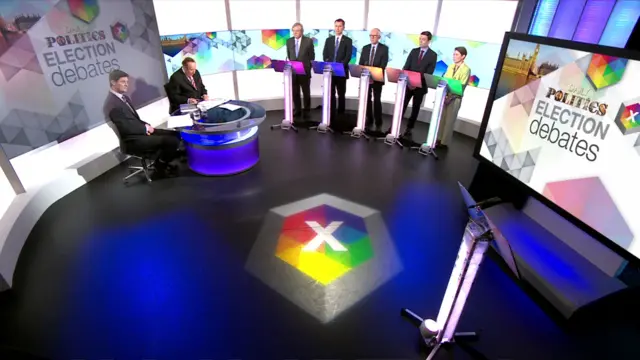
In a rapid about-face, we're jumping over to the Daily Politics debate on health and care now. Stick with us.
Right at the end in his own little piece to camera, Russell Brand doesn't endorse Ed Miliband but seems to give him a fair bit of credit.
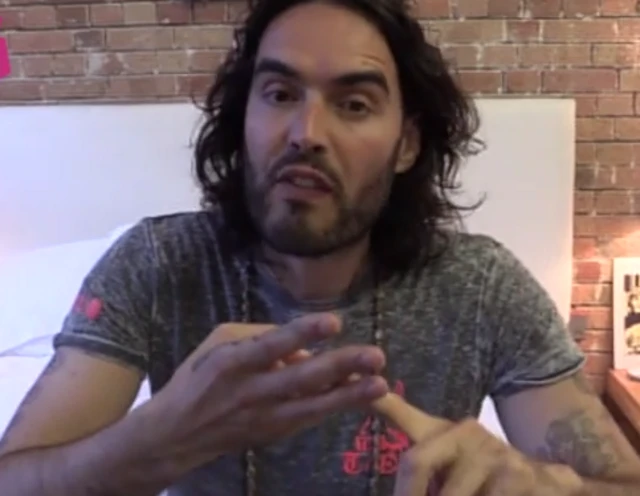 Image source, YouTube
Image source, YouTubeQuote MessageI think we learned a lot about Labour, we learned a lot about Ed Miliband. It's not a perfect interview but personally I found it a very interesting experience and I think it says a lot about Ed Miliband that he understands the way the media works now, the way the country feels at the moment, the way that people feel, that he was prepared to come round here and talk to us."
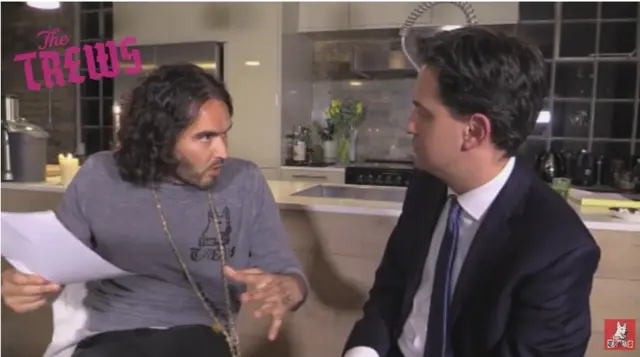 Image source, YouTube
Image source, YouTubeHere’s some highlights from the second half of Russell Brand’s full interview with Ed Miliband:
- The pair bond over both having had a “scrap” with Rupert Murdoch before. But if you’re the prime minister of Britain, Brand says, can’t you just pass a law to break up monopolies? “People want it!” he says. Mr Miliband responds: “These people are less powerful than they used to be.” Brand responds by saying they’re still quite powerful. It’s quite a clash, this.
- “You’ve got to be willing to stand up to these powerful forces,” the Labour leader says, “and I am.”
- On the big question of whether or not it’s worth bothering voting, Mr Miliband offers a reality check of its own: change won’t happen overnight. “It ain’t gonna be like that,” he says repeatedly. Instead he wants “real, deliverable, concrete change”. Mr Miliband thinks he wants “a sense that the country’s run a different way”.
- Brand is rather keen on this. “That is exactly it,” he says. “What we want to feel - ordinary people - is that there is a will in politics… because they want to represent people in the face of powerful elites.” He doesn’t want any “giddy ‘yes we can’ euphoria”, he wants someone who can “take on the powerful elites”.
- Mr Miliband agrees with Brand agreeing with him. They agree that the Tories are “incredibly dangerous”.
Commentators tweet their thoughts...
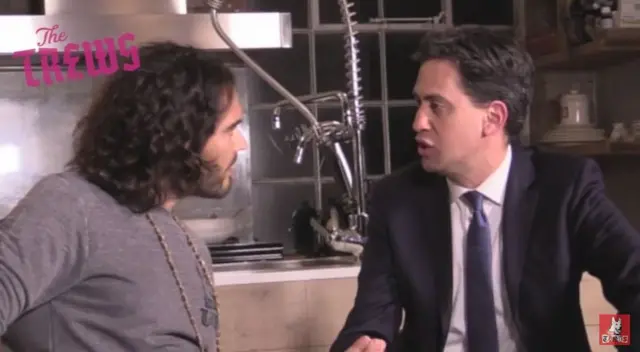 Image source, YouTube
Image source, YouTubeHere’s a few highlights from the first half of the ‘Mili-brand’ interview now uploaded on YouTube. We’re watching the second half now…
- What bothers Russell Brand, as he swigs from a bottle containing a clear liquid that looks suspiciously like water, is the “economic way” in which “powerful elites” control things “behind the scenes” - especially in the Tory party. Ed Miliband argues that he can change things - but says that change is driven by people who make things happen rather than politicians.
- Ed Miliband says Brand implied that no change has happened. “That’s just wrong. Change has happened and it will happen.”
- On bankers, Brand wants to know if they might go to prison. “Of course, if fraud is committed,” Mr Miliband says. The bigger question, he says, is helping bankers to help customers. The same applies to energy companies - they need to be confronted but must be able to function, too.
- Brand responds by complaining that “there’s nothing that can be done” because powerful people operate in the interests of big companies. “It’s all about, do you learn the lessons?” the Labour leader replies. The kinds of “practical” things that can be done include tackling zero hours contracts, for example. “That’s where we’ve made progress on workers’ rights, but we’ve sort of gone backwards.”
The BBC's assistant political editor tweets...
The editor of PoliticsHome.com
The full Ed Miliband-Russell Brand interview has just been released. We're watching it as I type and we'll bring you some extracts, but if you want to have a look for yourself, here it is., external
 The World at One
The World at One
BBC Radio 4
Questioned about welfare cuts, Michael Gove says Labour are "making a mistake" over their warnings that the Tories' plans could involve reductions in tax credits. "The past is the best guide to the future," he says. "Our track record is the best way in which we can be judged. The fact we've been able to save £21bn in the welfare budget," while simultaneously lowering child poverty levels, "is an indication of our values and our competence."
Asked specifically, are you going to cut tax credits, he replies: "We're going to freeze them for two years. We are not going to cut them."
The BBC's assistant political editor
 The World at One
The World at One
BBC Radio 4
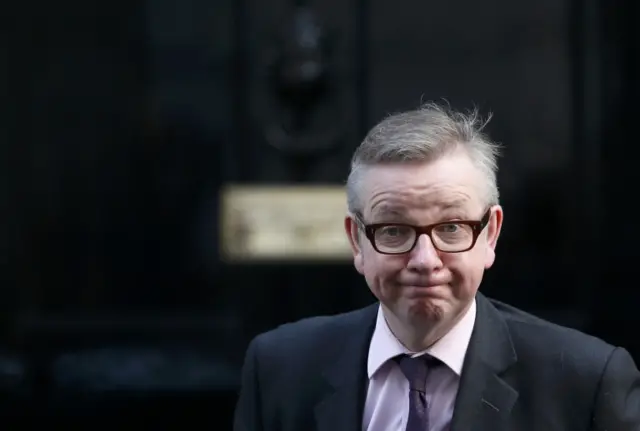 Image source, Reuters
Image source, ReutersNext up is Michael Gove, who says putting the Conservatives' tax commitments into law offers voters an "iron-clad" commitment. The words of the prime minster are "iron-clad" too, he says. "We have had... legislation already in this parliament in order to enshrine as a matter of law how we spend money," he says - referring to the 0.7% international development commitment.
After being played a clip of George Osborne talking about another chancellor's belief in the "statute book" (see 11.17), Mr Gove says the then-shadow chancellor was being "witty" in the Commons and that the difference between the two parties is one of their respective "track records".
And then comes this rather eyebrow-raising quote from Mr Gove that makes everything very clear. Asked why this "tax lock" wasn't in the manifesto, he replies:
Quote Message"What we're doing is operationalising everything that was in the manifesto."
 The World at One
The World at One
BBC Radio 4
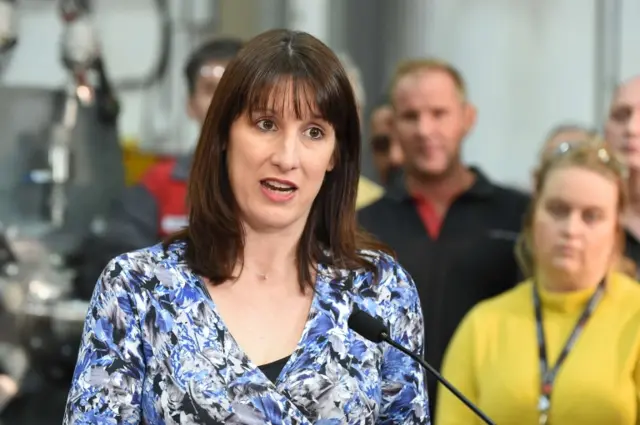 Image source, AFP/Getty Images
Image source, AFP/Getty ImagesShadow work and pensions secretary Rachel Reeves says the Tories' unfunded commitments on health, childcare and other policies are behind them putting out today's "gimmick" on tax policy. David Cameron repeatedly said this morning he had "seen the books" - but Ms Reeves tells The World At One that "we know the books are going to look pretty bad". Everything Labour has signed up, she says, are "wholly funded".
Asked if Labour would cut child benefit, she says no, adding: "We don't need to."
Text: 61124
Daily Politics viewer:
We really do need to question Milliband's judgement talking to Russell Brand. He couldn't have made a worst decision, it certainly does seem to smack of desperation
 Image source, AP
Image source, APWas Ruth Davidson emulating Margaret Thatcher with her tank riding?
 The World at One
The World at One
BBC Radio 4
Only 9% of voters trust the politicians to implement their policies in full, according to a poll for The World At One by Ipsos Mori. Pollster Gideon Skinner explains: "Members of the public are just wanting politicians to be realistic and open about what is achievable and what isn't." Ipsos Mori has been tracking trust in professions since the early 1980s - and politicians have always been at or near the bottom of the league. That doesn't mean this isn't problematic, though. "We know that young people are less likely to engage in traditional party politics," he adds.
 BBC Radio 4
BBC Radio 4
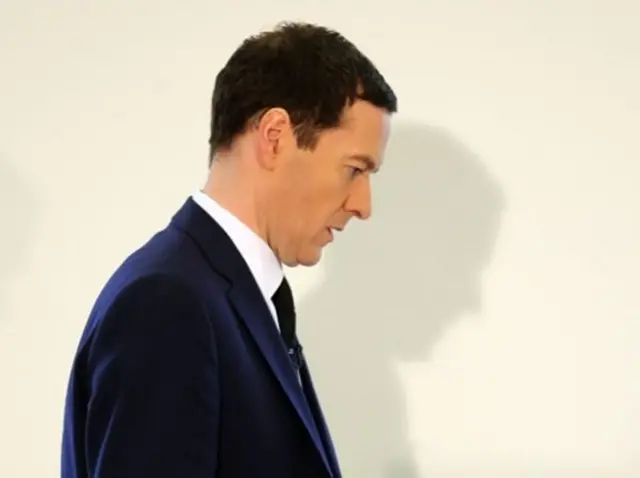 Image source, Reuters
Image source, ReutersJill Rutter, formerly of the Treasury and now programme director at the Institute for Government think tank, wonders who exactly is being bound by the Conservatives' proposed tax guarantee. "In a sense they're binding themselves," she says.
What exactly would happen if the government did break their own law? "What exactly is the sanction except for embarrassment?" she wonders. Would the chancellor be fined or dismissed from office? "The actual sanction beyond extreme political embarrassment is very difficult to see," she says.
Another phenomenon which happens with this sort of approach - and we've seen it with the aid pledge - is debate over what can be counted as aid money or a tax rise, or not. Is a headline rate a tax increase? Are allowances part of it?
Ms Rutter doubts whether civil servants will be particularly enthusiastic about the proposal to legislate, anyway. "I don't think the Treasury will be institutionally keen that introduce artificial constraint on discretion," she tells The World At One.